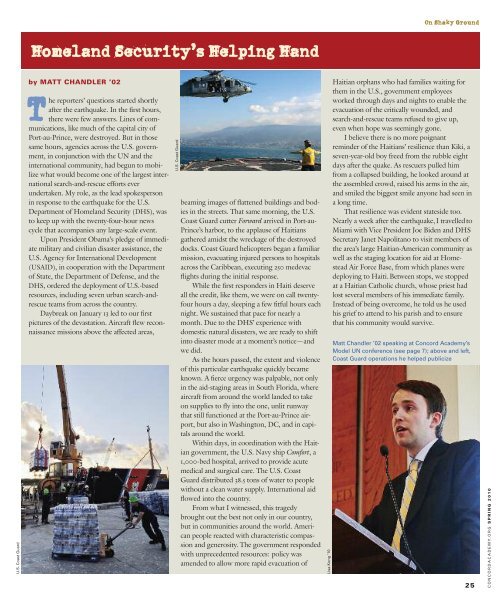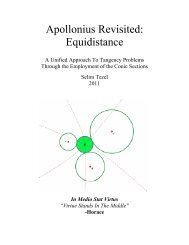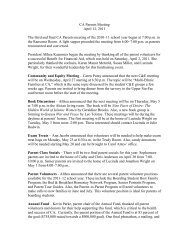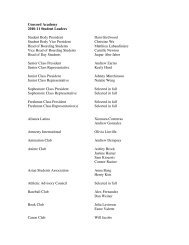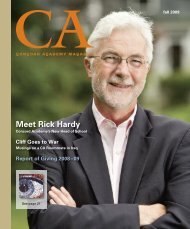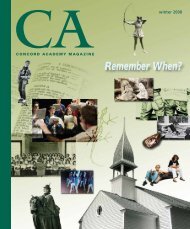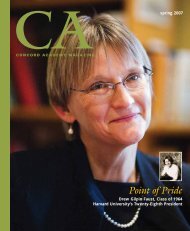Class Notes
S - Concord Academy
S - Concord Academy
- No tags were found...
Create successful ePaper yourself
Turn your PDF publications into a flip-book with our unique Google optimized e-Paper software.
On Shaky GroundHomeland Security’s Helping HandU.S. Coast GuardTby MATT CHANDLER ’02he reporters’ questions started shortlyafter the earthquake. In the first hours,there were few answers. Lines of communications,like much of the capital city ofPort-au-Prince, were destroyed. But in thosesame hours, agencies across the U.S. government,in conjunction with the UN and theinternational community, had begun to mobilizewhat would become one of the largest internationalsearch-and-rescue efforts everundertaken. My role, as the lead spokespersonin response to the earthquake for the U.S.Department of Homeland Security (DHS), wasto keep up with the twenty-four-hour newscycle that accompanies any large-scale event.Upon President Obama’s pledge of immediatemilitary and civilian disaster assistance, theU.S. Agency for International Development(USAID), in cooperation with the Departmentof State, the Department of Defense, and theDHS, ordered the deployment of U.S.-basedresources, including seven urban search-andrescueteams from across the country.Daybreak on January 13 led to our firstpictures of the devastation. Aircraft flew reconnaissancemissions above the affected areas,U.S. Coast Guardbeaming images of flattened buildings and bodiesin the streets. That same morning, the U.S.Coast Guard cutter Forward arrived in Port-au-Prince’s harbor, to the applause of Haitiansgathered amidst the wreckage of the destroyeddocks. Coast Guard helicopters began a familiarmission, evacuating injured persons to hospitalsacross the Caribbean, executing 250 medevacflights during the initial response.While the first responders in Haiti deserveall the credit, like them, we were on call twentyfourhours a day, sleeping a few fitful hours eachnight. We sustained that pace for nearly amonth. Due to the DHS’ experience withdomestic natural disasters, we are ready to shiftinto disaster mode at a moment’s notice—andwe did.As the hours passed, the extent and violenceof this particular earthquake quickly becameknown. A fierce urgency was palpable, not onlyin the aid-staging areas in South Florida, whereaircraft from around the world landed to takeon supplies to fly into the one, unlit runwaythat still functioned at the Port-au-Prince airport,but also in Washington, DC, and in capitalsaround the world.Within days, in coordination with the Haitiangovernment, the U.S. Navy ship Comfort, a1,000-bed hospital, arrived to provide acutemedical and surgical care. The U.S. CoastGuard distributed 38.5 tons of water to peoplewithout a clean water supply. International aidflowed into the country.From what I witnessed, this tragedybrought out the best not only in our country,but in communities around the world. Americanpeople reacted with characteristic compassionand generosity. The government respondedwith unprecedented resources: policy wasamended to allow more rapid evacuation ofLisa Kong ’10Haitian orphans who had families waiting forthem in the U.S., government employeesworked through days and nights to enable theevacuation of the critically wounded, andsearch-and-rescue teams refused to give up,even when hope was seemingly gone.I believe there is no more poignantreminder of the Haitians’ resilience than Kiki, aseven-year-old boy freed from the rubble eightdays after the quake. As rescuers pulled himfrom a collapsed building, he looked around atthe assembled crowd, raised his arms in the air,and smiled the biggest smile anyone had seen ina long time.That resilience was evident stateside too.Nearly a week after the earthquake,I travelledtoMiami with Vice President Joe Biden and DHSSecretary Janet Napolitano to visit members ofthe area’s large Haitian-American community aswell as the staging location for aid at HomesteadAir Force Base, from which planes weredeploying to Haiti.Between stops, we stoppedat a Haitian Catholic church, whose priest hadlost several members of his immediate family.Instead of being overcome, he told us he usedhis grief to attend to his parish and to ensurethat his community would survive.Matt Chandler ’02 speaking at Concord Academy’sModel UN conference (see page 7); above and left,Coast Guard operations he helped publicize25C O N C O R D A C A D E M Y. O R G S P R I N G 2 0 1 0


